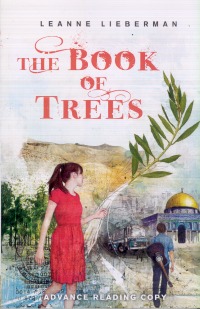| ________________
CM . . .
. Volume XVII Number 9. . . .October 29, 2010 
 |
The Book of Trees.
Leanne Lieberman.
Victoria, BC: Orca, 2010.
246 pp., pbk., $12.95.
ISBN 978-1-55469-265-1.
Grades 8-11 / Ages 13-16.
Review by Vasso Tassiopoulos.
*** /4
Reviewed from Advance Reading Copy. |
| |
|

excerpt:
She believed in God the way the other Bínos Sarah girls did. If you read the bible literally, you could justify killing other people for the sake of a homeland: Israel was worth it. And some Palestinians were willing to kill too. I felt a chill run down my spine. I was surrounded by God driven violence. I glanced at the bible on my desk and shuddered. What a dangerous book.
I sat up my head spinning. I wanted to rewind my thoughts. I became religious to bring love and peace into the world. But it seemed Judaism, at least in Israel, wasnít about the good of all humans, just the good of all Jews. Were all religions like that? It was like Dan said: you worried about your own people first. Iíd wanted to be part of a community, but not at the expense of other people.
In The Book of Trees, Leanne Lieberman explores complex issues surrounding religion and politics in Jerusalem through her 17 year old protagonist, Mia. Judaism in Israel and the politics surrounding the country are viewed through Mia, a Canadian girl from Toronto who grew up with a non traditional Jewish mother and an Irish Catholic musician father who is absent throughout much of her childhood. Mia initially begins to deeply explore her Jewish roots as a means of coping with a fractured family life and a broken romantic relationship.
Before discovering Judaism, the troubles in Miaís life led her to fall into a reckless form of depression. She attempts to make a new life for herself as an orthodox Jew in order to escape her troubled and depressed state and, hopefully, to achieve a normal family life for herself. After graduating high school, she spends her summer at a Jewish seminary, The Bínos Sarah Yeshiva for Girls, in Jerusalem, where she unexpectedly begins to question her beliefs and comes to consider whether being Jewish has a positive impact in her life. Through her experiences in Israel and a new romantic interest outside of the seminary, she begins to realize how religion affects her own identity as well as how acts of unquestioned faith affect the world around her.
Much of the novel is steeped in Judaic terms, rituals, and traditions which can be overwhelming for readers unfamiliar with Judaism. A glossary provided in the back section of the novel is often a helpful resource for readers who may become lost or confused with the foreign terms. The novel unfolds in Jerusalem in the summer of 1995, presumably for detailed accuracy in setting considering Liebermanís ďAuthorís NoteĒ at the end of the work in which she explains that is the year in which she visited Israel as a university student. Miaís realizations and longing to live in a peaceful world are also a reflection of Liebermanís belief in social justice and protection of human rights in Israel for all of its peoples.
The trees in the novelís title relate to one of the first instances in which Mia learns about the inhumane displacement and treatment of Palestinians in Israel when it was being built as a homeland for Jews. She visits a forest planted by the Jewish state over what was once an Arab village, and she is troubled by the fact that people were forced out of their homes or, in some cases, killed for land. Miaís rebellions nature leads her to explore life outside of the seminary and the world that exist in non Jewish sections of Israel. Throughout her independent travels, she gains an understanding of the importance of humanity over religion in her life.
Liebermanís The Book of Trees is well-balanced in exploring issues of faith and humanity in the Israel Palestine conflict through its Canadian teen protagonist who is coming of age. The novel also gives readers a human rights point of view when considering political conflict in Israel. The storyís overall strength is in its major theme of questioning faith that many young adult readers may come to experience when they are close to Miaís age and place in life.
Recommended.
Vasso Tassiopoulos is currently completing a Master of Arts degree in Childrenís Literature at the University of British Columbia and currently holds the position of recording secretary for The International Board on Books for Young People (IBBY) Canada.
 To comment
on this title or this review, send mail to cm@umanitoba.ca.
To comment
on this title or this review, send mail to cm@umanitoba.ca.
Copyright © the Manitoba Library Association. Reproduction for personal
use is permitted only if this copyright notice is maintained. Any
other reproduction is prohibited without permission.
NEXT REVIEW |
TABLE OF CONTENTS FOR THIS ISSUE
- October 29, 2010.
AUTHORS |
TITLES |
MEDIA REVIEWS |
PROFILES |
BACK ISSUES |
SEARCH |
CMARCHIVE |
HOME |
|
